CHOOSING HOPE






Planning for tomorrow, acting today ANNUAL REVIEW 2021-22










Another year, another cacophony of klaxon calls for climate and nature.
It’s hard reading, and it’s utterly understandable that anyone who recognises the depth of the problem and the scale of the challenge feels a very real sense of fear for the future – for ourselves, for the most vulnerable, for our children and future generations, for our awe-inspiring natural world.
Turning that fear into action requires a vision of something better, and the tools, knowledge and skills to help turn the vision into reality.
That’s where CAT comes in. For nearly 50 years, CAT has focused on solutions to environmental issues – ways of living without fossil fuels, ways of being that can protect and enhance
the natural world. From low-impact building and renewable energy to sustainable food production and social change, CAT helps people see what’s possible and gives them the tools to help make change happen. Now, we’re determined to do more, to go further. Every fraction of a degree of warming matters, every species lost is gone forever – that’s why we’re raising our ambitions with a transformational new project, launched at the end of 2021, to scale up our work and reach many more people (see page 6).
I’d like to offer my thanks, and the thanks of the Board of Trustees, to the stalwart support over the past decade of my predecessor as Chair, Mick Taylor, who stepped down at the end of the year. Thank you, too, to all our incredible staff, volunteers, members, supporters, students, graduates and visitors, who inspire us every day to work together to build the better world we all know is possible. Diolch yn fawr iawn.
Sally Carr Chair of Trustees
CAT’s Head of Development, Eileen Kinsman, and Finance and Operations Director, Paul Booth, have been appointed interim co- CEOs while recruitment is planned for a permanent replacement for Peter Tyldesley, who left CAT at the end of 2021. Eileen and Paul have both been key members of CAT’s Senior Management Team for several years, helping drive our success and shape CAT’s long-term strategy and plans.
Eileen and Paul said, “We are delighted to be leading this fantastic organisation at a time when our environmental education and research work is more vital and in demand than ever before. We are really looking forward to working with CAT staff, volunteers, supporters, students and the wider community as we enter an exciting new phase in CAT’s near 50-year history.”
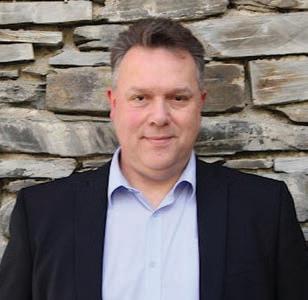
In 2021-22, we scaled up our work to reach new audiences and share the sustainable solutions we so desperately need.
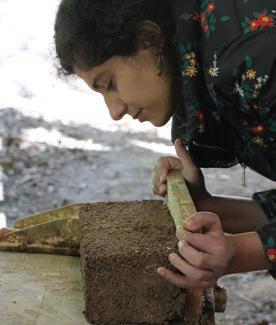

Making plans to transform our eco centre , to inspire, inform and enable more people. Our ideas currently include a new visitor experience to bring practical solutions to life, a sustainable skills hub to equip the workforce of the future, and expanded digital outreach to open the doors of CAT to even more people all over the world. (see page 6)
Supporting councils, communities and organisations through our Zero Carbon Britain Hub and Innovation Lab. We launched a free online resource hub to help organisations take action on the climate and biodiversity emergency, and offered our first courses in Carbon Literacy for local authorities. Our Innovation Lab team supported a range of councils and community groups to explore barriers to taking action, and to work together on co-creating solutions.
(see page 8)
Welcoming more students than ever to our CAT Graduate School of the Environment – with more than 250 students joining us to gain an in-depth understanding of environmental issues and potential solutions. We refreshed our range of courses to help more people take action towards a safer, healthier, fairer future for all.
(see page 12)
Helping to fill the sustainable skills gap by developing a new Retrofit Masterclass to build knowledge and expertise within the building industry. We secured funding for a new partnership project providing sustainable skills training, supporting green jobs, and increasing understanding and knowledge of environmental solutions. And throughout 2021, we ran online events and courses to help people build their sustainability skills. (see page 14)
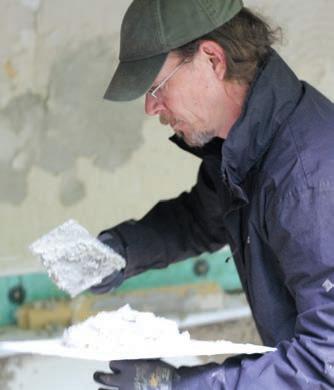
Taking part in the COP26 climate negotiations in November. We shared knowledge and research with participants from around the world and made new connections and partnerships to increase our impact. As official Observers, we were right there where the official talks, presentations and negotiations took place. And we joined an estimated 100,000 people marching through Glasgow as part of the Global Day of Action calling for stronger, faster action on the climate crisis from world leaders. (see page 16)

All this was possible because of YOU. As the challenges of the pandemic continued and the cost-of-living crisis began to bite, you continued to support us generously.
In 2021-22, we began making ambitious plans to reimagine and redevelop the eco centre, with a new immersive visitor experience that offers a microcosm of a future based on sustainable choices, embedded within high quality learning and practical training spaces.
For nearly 50 years, our site in Mid Wales has shown people a better future is possible and helped them take action to make it happen. Now it is time for the next stage in its history. Transforming the eco centre is essential if we are to inspire, inform and enable a bigger, more diverse audience to respond to the rapidly worsening climate and biodiversity emergency.

We will create new spaces for education in environmental solutions, a sustainable skills hub to deliver green skills for the future, and an immersive world-class visitor experience. Alongside this, we will develop our digital outreach to engage people around the globe. In November 2021, we secured funding from the UK Community Renewal Fund to carry out feasibility studies and create a new site plan and visitor experience plan. To support this work, in January 2022 we awarded contracts to internationally renowned architect firm, Haworth Tompkins, and planning and development specialists, Turley, under a consortium led by Faithful & Gould.
“CAT has the unique advantage of being able to show first-hand environmental measures in action in real life, rather than being a mere exhibition space. To inspire real behaviour change, learning needs to be relatable and also enjoyable so that it does not feel like a choice between joy and environmental responsibility – and this is the balance we hope to strike.”
Lucy Picardo, Director of Haworth TompkinsThis year, the CAT visitor centre reopened its doors to visitors, students and short course participants, after around six months of closure
• Continuing into spring/summer 2022, we will be collecting ideas and feedback from our stakeholders – members, supporters, students, visitors, locals and others.
• Working with us, architects Haworth Tompkins and project partners will help to
due to the global pandemic. It was wonderful to welcome you back and share our energy and enthusiasm for climate solutions in person once again.
create a new site plan and visitor experience plan, while planning and development consultants Turley will provide support for market research and business planning.

• We will begin to draft our plans for what the new eco centre could look like and share them when they’re ready.
“Community consultation is at the heart of our plans, and we’re excited to move into this next stage of development with our new partners –creating opportunities for local people, businesses, members, students and stakeholders alike to have their say on the future of CAT, and to ensure that we are creating the best
Eileen Kinsman, Interim Co-CEOpossible benefits for the people, environment and economy of Mid Wales.”
Zero Carbon Britain offers a vision of what energy, buildings, transport, industry, diets and landuse could look like in the future, helping councils, communities, organisations and businesses to meet the challenges of the climate and biodiversity crisis.
This year, we launched the Zero Carbon Britain resource hub, as well as new courses and Innovation Labs. These are designed to help turn climate emergency declarations into action, reduce emissions, and create systemic change in support of mitigation of and increased resilience to climate change and biodiversity loss.
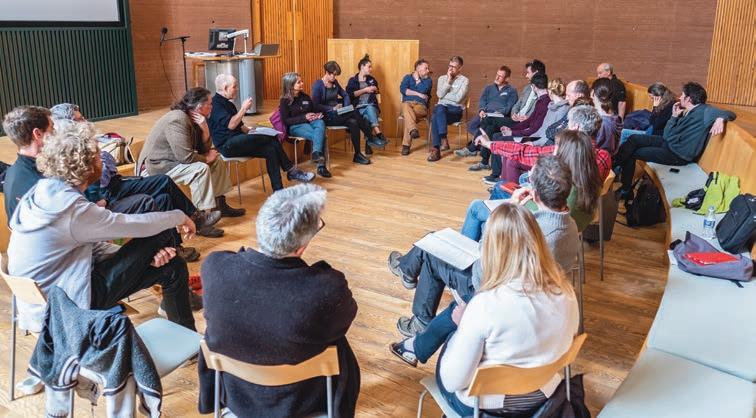
Our Zero Carbon Britain online resource hub is now making it easier for organisations to find the information they need to reduce their carbon emissions and support biodiversity. For the first time, the hub brings together an extensive library of free resources on everything from calculating the value of trees in your local area, to tackling climate change at work, to how councils can engage the community.
In May 2021, we launched a new series of online courses focused on the themes presented in our Zero Carbon Britain research. The first in the series explored local energy solutions, looking at how to set up
and run a community or local energy project, with sessions on renewable energy options, efficiency and placement, how to kickstart a project and get stakeholders on board, and important legal and financial considerations. We offered funded places on our Zero Carbon Britain: Live Online courses via a bursary, making training more accessible to all.

We also offered our first Carbon Literacy courses for local authorities, providing them with ‘an awareness of the carbon costs and impacts of everyday activities and the ability and motivation to reduce emissions,
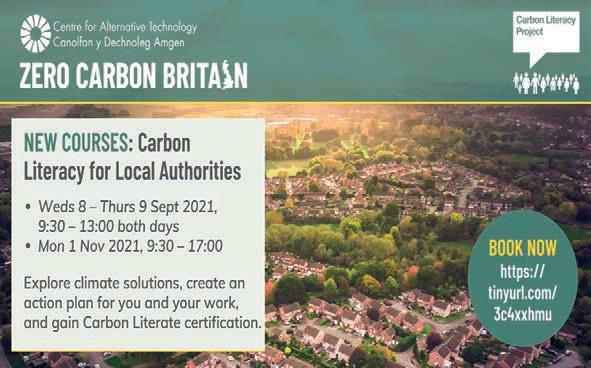
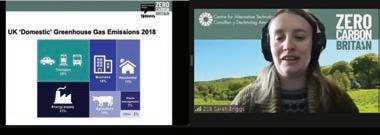
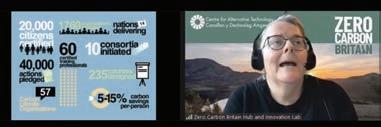

on an individual, community and organisational basis’. Our collaboration with the Carbon Literacy Project offers a ‘train the trainer’ model, with the aim that training cascades through an organisation. This has become one of the most popular courses we offer.
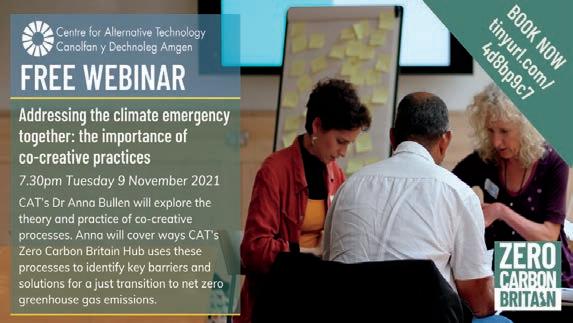
Our first course coincided with Carbon Literacy Action Day on 1 November, the first day of COP26. This was the largest ever live climate action training event, with hundreds of organisations and thousands of learners completing their Carbon Literacy training at the same time.
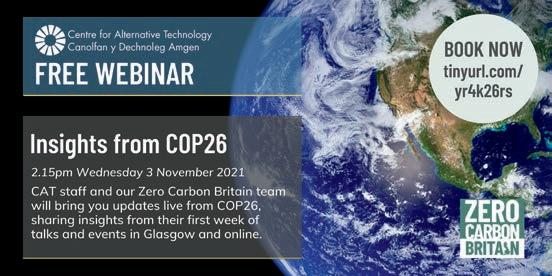
Through Zero Carbon Britain Innovation Labs we supported councils and community groups to explore the barriers to taking action, and to work together to overcome them.
In 2021, in partnership with Keele University, we worked with 32 representatives from 10 councils across Staffordshire to explore the challenges they face in reaching net zero and co-create an approach
to achieve their climate goals. The process helped the participants to better understand the barriers to reaching net zero, create a vision for the county, and set out objectives towards achieving their individual and collective aims.
Another Innovation Lab with Shropshire Climate Action Partnership (SCAP) focused on one big challenge: how to better engage businesses across Shropshire
in SCAP’s climate action plan. We ran the lab in conjunction with our Graduate School of the Environment, supporting our Masters students in their Applied Research module. Representatives from 14 small and medium enterprises (SMEs) came together to co-design solutions to the barriers businesses currently face, enabling SCAP to better engage with and support them.
Thanks to the generosity of our supporters, we were able to expand the Zero Carbon Britain team this year, which will allow us to support more councils, communities and other organisations to act on the climate and biodiversity emergency. Thank you.
On 30 September 2021, CAT’s Zero Carbon Britain team, alongside Ashden, Climate Emergency UK and Aberdeen Climate Action, co-hosted an online conference for 800 people, showcasing some of the best actions on the climate and nature emergencies by local authorities from around the UK and Europe.
Our County Communities Climate Action Forum supported people and groups working at county level on tackling the climate and biodiversity emergency. In this final year, we covered land and biodiversity; transport; consumption, waste and resources; and small businesses.
• In 2022-23, we will publish a report making recommendations for councils based on the Staffordshire Councils Innovation Lab.



• Following successful training for the Local Government Association in September 2021 and January 2022, our Zero Carbon Britain team has been commissioned to provide further programmes for LGA as part of their Leadership Essentials: Climate Emergency series.
• CAT’s Zero Carbon Britain team has been awarded a contract by the Local Government Association to run an innovation lab to support the creation of ‘Sustainability in all Policies’ guidance.






• Two new online courses will be added to our suite of Zero Carbon Britain training programmes for 2023 – ‘Zero Carbon Britain: Carbon Literacy for the Housing Sector’ and ‘Zero Carbon Britain: Carbon Literacy for Communities’.

More than 250 students – our highest ever intake – joined our Graduate School of the Environment in September 2021 to develop the knowledge and skills to play their role in responding to the climate and biodiversity crisis.

To enhance the diversity of the people studying with us, we offered a range of bursaries for new postgraduate students in 2022, made possible thanks to donations from charitable trusts and CAT members and supporters. These allowed us to support students who would otherwise have been unable to afford to study at CAT.
This year saw the launch of the new Llwyngwern Bursary, named after the transformed slate quarry CAT calls home.
This year, students enjoyed lectures and practicals from more than 30 external guest speakers, including Professor Kevin Anderson from the Tyndall Centre; Asad Rehman, a founder of the COP26 Coalition; Dr Haseeb Irfanullah from the Center for Sustainable Development in Dhaka; Judy Ling Wong CBE, Honorary President of the Black Environment Network; Professor Tim Lang from the Centre for Food Policy at City University; and Professor Lorraine
Whitmarsh, Director of the UK Centre for Climate Change and Social Transformations. We also welcomed CAT graduate Agamemnon Otero MBE, who talked with students about his work empowering communities. Four of our postgraduate courses were updated and revalidated this year, following a review by our validating partner, the University of East London (UEL). Through consultation with students, CAT graduates and industry leaders, we updated the courses to reflect the evolving skills and knowledge needed to address the climate and biodiversity crisis across a wide range of sectors and scales.
In collaboration with Aberystwyth University, we co-curated an exhibition called ‘The Lives We Want’ at Aberystwyth Arts Centre, which showcased students’ visions of what matters and how to engage with planetary realities and relationships. Visitors to our eco centre this summer were treated to an exhibition of ‘Alternative Architectures’, showcasing current fourth and fifth-year MArch Sustainable Architecture students’ Final Design Projects.
On 10 July 2021, we welcomed more than 50 CAT graduates and their guests to our very first online graduation ceremony. Following the postponement of the in-person ceremony because of the pandemic,
this was an opportunity to celebrate our graduates’ achievements together.
And we shared the success of previous CAT graduates, including Scott Simpson co-founder of biobased materials and construction company IndiNature, whose company received £3m backing from the Scottish National Investment Bank to open a dedicated natural insulation factory in the Scottish Borders. Adaptavate, a company developing and manufacturing sustainable and low-carbon building materials, founded by CAT graduate Tom Robinson, was awarded more than £2m in investment to scaleup production of Breathaboard, a carbon-absorbing plasterboard.
Next:
• CAT’s Graduate School of the Environment will be reviewed by the Quality Assurance Agency for Higher Education (QAA), the UK’s independent quality body for higher education, with the results to be published in June 2022.
• Our new Master of Research (MRes) Sustainability and Adaptation course will be launched at the start of the next academic year to meet the growing demand for researching zero carbon solutions. The course will see its first intake of students in September 2023.
To achieve the retrofit revolution needed to cut carbon emissions and create sustainable jobs, we need thousands of multi-skilled tradespeople working on homes and buildings across the UK. There is currently a huge skills gap in this area, holding back progress and keeping many of us stuck in draughty, energy inefficient homes.
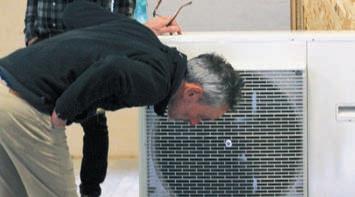
The UK Community Renewal Fund awarded CAT and Severn Wye Energy Agency funding for a new partnership project providing sustainable skills training, supporting green jobs, and increasing understanding and knowledge of environmental solutions. Not only will the project help address the climate
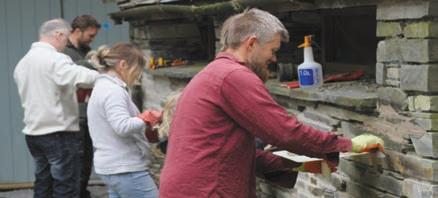
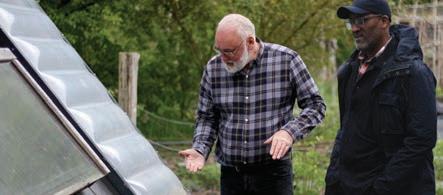
emergency and help fill the skills gap, it will also contribute to the economic recovery of Mid Wales for many years to come.
This year, using this new funding, we developed a new Retrofit Masterclass to help build skills and knowledge within the building industry. This pilot programme is designed to test out a new in-depth hands-on immersive programme specifically aimed at the construction sector. Taking a whole-house approach to retrofit, it covers both improving the energy efficiency of buildings and installing renewable energy systems and heat pumps.
CAT also received Arwain funding, an EU project to support innovative

solutions in rural areas, through Powys County Council, to develop a Sustainability Skills Cluster in the region. The funding enabled the creation of a partnership with Mid Wales Manufacturing Group and others, and a regional needs assessment was completed for green skills and training. The partnership then delivered pilot sessions in community settings to provide some of the vocational skills highlighted in the report.
In response to the social distancing restrictions of the pandemic, throughout 2021 we ran online events and courses to help people build their sustainability knowledge and skills.
“The tutors were super knowledgeable and prioritised confidence-building as well as skills. This has been a lifechanging week for me – I did stuff I never thought I could do.”
Suzanne Oakley, short course participantWhen guidelines allowed, we welcomed people back onsite for inperson short courses on everything from fixing a damp house to building a small wind turbine.
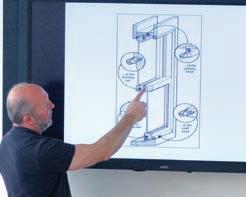


• The first participants will take part in our new Retrofit Masterclass in 2022. Findings from the pilot programme will be fed into the development of future courses aimed at helping to address the green skills gap, one of the key barriers to reaching zero carbon.
• Additional new skills-based courses will also be explored, with the potential to develop accredited courses for 16-18 year olds.
A team from CAT was in Glasgow for the COP26 climate negotiations in November. This was a pivotal moment for all nations to step up their carbon emissions reduction commitments and align with the 1.5°C Paris Agreement goal.
All week, we shared knowledge and research with participants from around the world. Meeting people and organisations from across the environmental and climate justice movement gave us a valuable opportunity to make new connections and partnerships to increase our impact.
CAT was one of a handful of organisations from Wales awarded Observer Status by the United Nations Framework Convention on Climate Change (UNFCCC), giving us access to the areas where the official talks, presentations and negotiations took place.
We spoke at several events as part of the COP26 programme. Our Innovation Lab Manager, Dr Anna Bullen, took part in a panel discussion, alongside First Minister Mark Drakeford and Climate Change Committee Chair Lord Deben, on the importance of distributed leadership in climate action. And Paul Allen, Zero Carbon Britain’s Knowledge
and Outreach Coordinator, outlined the benefits of national zero carbon scenarios working across sectors to bring to life a vision of a positive future.
As part of the Global Day of Action on Saturday 6 November, an estimated 100,000 people –including the CAT COP26 team –marched through Glasgow, calling for stronger, faster action on the climate crisis from world leaders. Many CAT supporters took part in events across the UK and online to make their voices heard – thank you.
Throughout COP26, a series of ‘COP Cymru’ events took place across Wales, organised by the Welsh Government. At CAT, we hosted a nature-themed Mid Wales regional roadshow, as well as a panel discussion on behaviour change.
In the run up to COP, we welcomed First Minister Mark Drakeford to CAT
“Being at COP26 has given us the chance to link with people and organisations working towards the same goal, which is essential to deliver climate solutions at the scale and speed demanded by the climate crisis.”
Eileen Kinsman, Interim Co-CEO
to discuss our practical solutions to the climate crisis. We focused on the importance of training and education and the need for rapid change across all sectors to reduce emissions.
“It’s been great to hear of all the work [CAT] do to help us all to prepare for a more sustainable future. The way we live at home, the way we work, the way we travel – those things make a difference when we add them all up. …a really powerful message from Wales in Glasgow.”
Mark Drakeford, First Minister of Wales
• We will continue to use our UNFCCC Observer Status to take part in international climate negotiations, with plans to join COP27 in Egypt in November 2022 remotely.


• We will continue to build on our work with policymakers and partner organisations to explore and share solutions to the climate and biodiversity emergency.

Guillermo had a background in architecture and refurbishing historical buildings in Spain before his studies at CAT, yet he felt he lacked the technical knowledge to tackle environmental issues in his work. To fill this knowledge gap he chose our Green Building course, and after graduating in 2021 he now works at PYC a sustainable construction company based in Mid Wales.
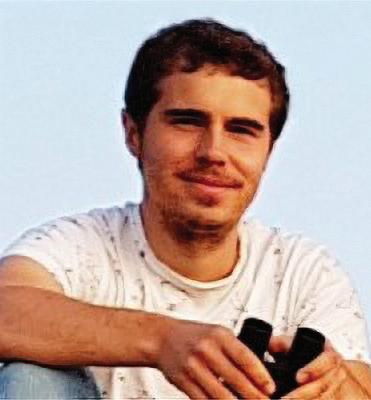
“CAT was a wonderful place to start my journey into a fulfilling professional path. CAT’s location followed by its sustainability credentials stood out to me which is why I chose to study there.”

Rosie graduated from the Sustainable Architecture Part 2 course at CAT, and since early 2022 has worked for Matt+Fiona, a social enterprise that believes everyone should have the right to help shape their built environment. Many of Rosie’s student projects addressed the intersection between social and environmental injustices within the built environment, and, through voluntary work and activism, Rosie seeks to raise awareness of the issues of climate change and ecological degradation, as well as the racial inequalities within the architectural industry and beyond.
This is a small selection of the thousands of members of the CAT community taking practical steps to building a sustainable future.
Jason took part in our five-day Retrofit Masterclass for people in the building industry in Powys. Participants developed their practical skills and learned how retrofitting buildings will help to save energy and reduce emissions. The course covered areas including the whole-house retrofitting approach, airtightness, insulation, damp, working with lime and lime plaster, renewable energy technologies, and heat pumps.
“My purpose for joining the Retrofit Masterclass was to add some practical skills to my learning journey and to get a greater understanding of the detailing involved in the practical processes. It really was a fantastic experience.”

Sue is coordinator of Zero Carbon Shropshire – a network of small business owners volunteering to tackle the climate emergency. The businesses in her working group wanted to understand the barriers to small to medium enterprises engaging with sustainability and starting their zero carbon journey but lacked the expertise to carry out the necessary research. That’s where CAT’s Innovation Lab came in.
“Participating in CAT’s Innovation Lab was fun, thought provoking, challenging, and provided the research capability we lacked. It accelerated our work and enabled us to go from start-up working group to action planning within just six months.”
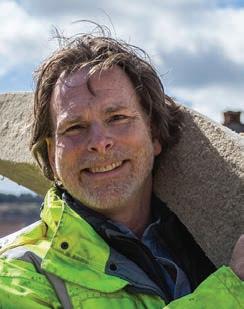

During his time at CAT, on one of our Graduate School of the Environment postgraduate courses, Scott Simpson gained the technical skills he needed to launch IndiNature, a company manufacturing natural insulation products. Its IndiTherm insulation is made from UK- grown industrial hemp, which captures carbon as it grows and results in a product that is reusable, recyclable and biodegradable. IndiNature recently received £3m backing from the Scottish National Investment Bank to open a dedicated natural insulation factory in the Scottish Borders.
“Signing up for a CAT Masters degree was the best decision I ever made. I learnt a lot of technical skills to help with choosing appropriate materials and systems for different buildings, systems and climates.”
90% of expenditure on charitable activities
Over 5000 volunteer hours
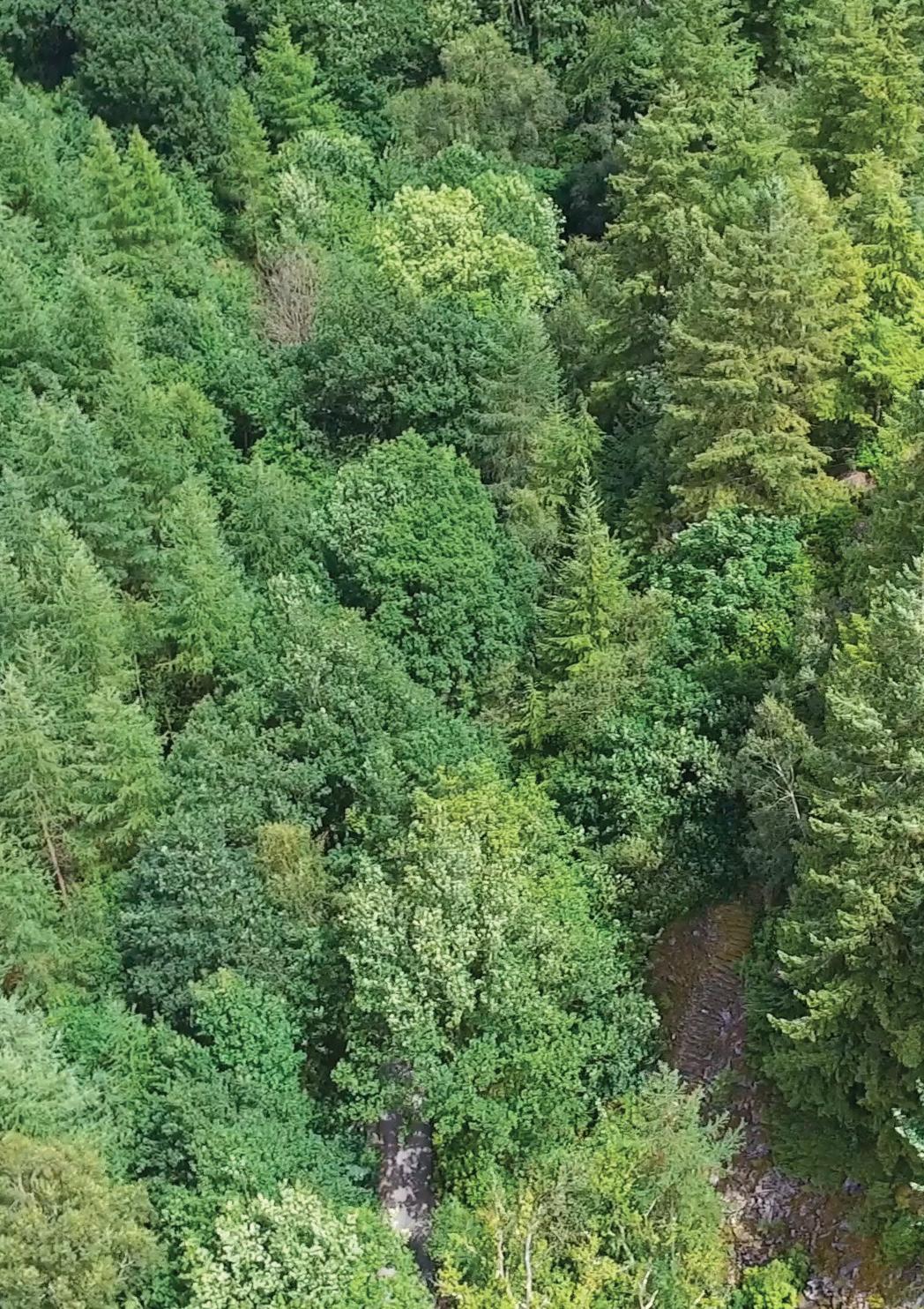
445,000 website users
4 Innovation Labs
facebook followers
130 Innovation Lab participants
14,275 visitors to the CAT eco centre despite COVID closures and restrictions (37,770 in 2019/20 )
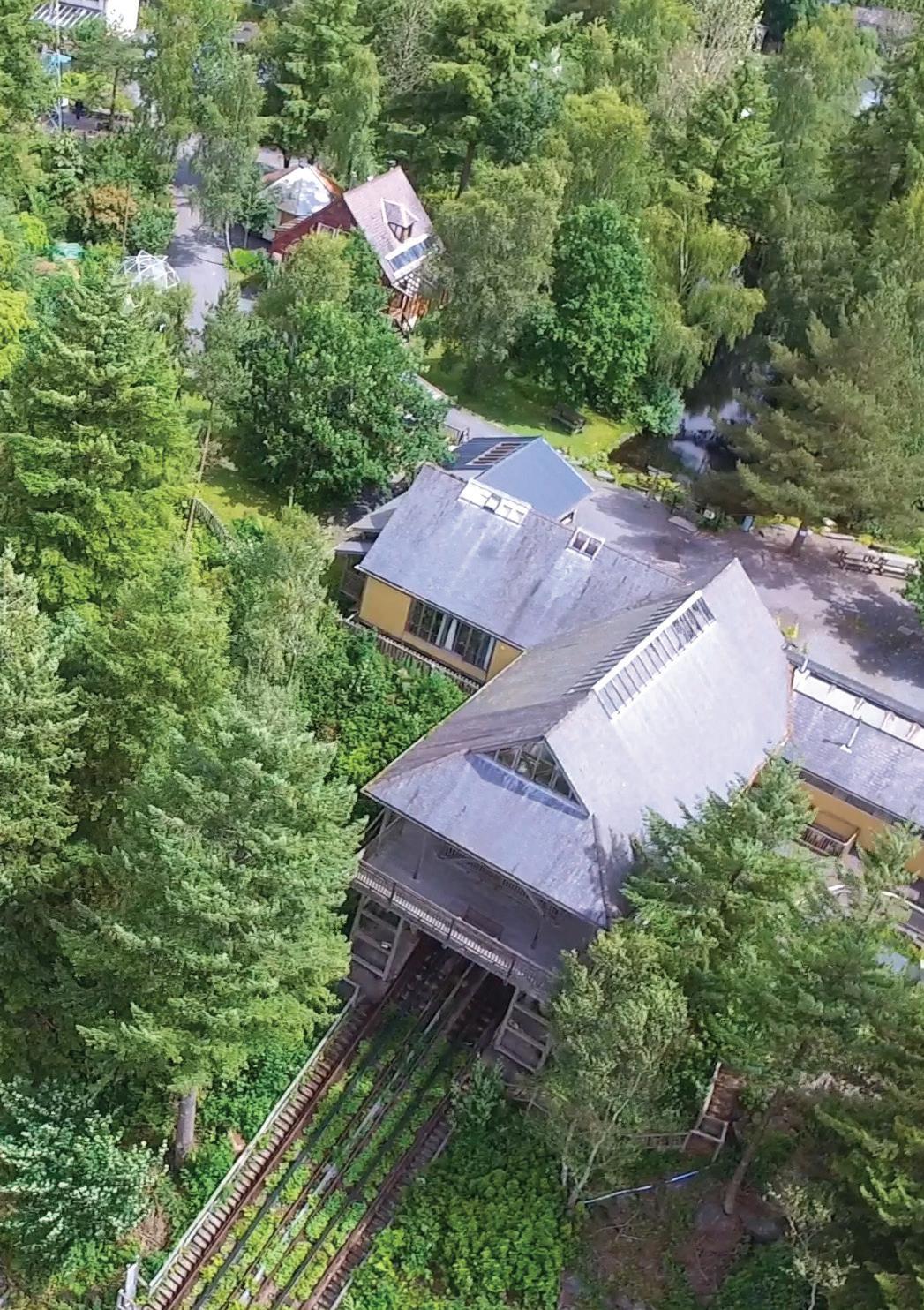
Centre for Alternative Technology Annual Review 2021-22
Carbon Literacy & Zero Carbon Britain training courses
256 students starting CAT Masters courses
76 short courses
499 people on Zero Carbon Britain training courses
157 graduating students in 2021
998 short course participants
Around 700 students studying for a CAT Masters
£3.74 raised for every £1 spent on fundraising and membership
2021/22 income and expenditure (1 April 2021 to 31 March 2022)
Our membership and supporter base continued to grow in 202122, helping to fund our vital work. Thanks to the generosity of our supporters, we raised £869,904 last year, exceeding our targets and previous years’ income. For every £1 we spent on fundraising and
membership, we raised £3.74. CAT is registered with the Fundraising Regulator and adheres to the Code of Fundraising Practice. We monitor all our fundraising activity closely to ensure value, compliance and integrity in all our activities.
We would like to thank the following funders that helped make our work possible this year:
1970s Trust
H C D Memorial Fund
The Cobb Charitable Trust
The Marmot Charitable Trust
The Moondance Foundation
The Orr Mackintosh Foundation
UK Government Community Renewal Fund via Powys County Council


All of our individual members and donors
Thanks also to the kind donors of the following Graduate School of the Environment bursary awards:
The Ethel and Gwynne Morgan Trust bursary
The Sir John Houghton bursary
The Llwyngwern bursary
The Rose Jessica-Maia bursary
We rely on the generosity of our supporters and a small number of charitable trusts to make change happen. To support our vital work, please donate online at
www.cat.org.uk/donate.
Your gift today could help us educate, inspire and enable a bigger and more diverse community of changemakers to respond to the climate and biodiversity emergency.
Thank you.
Everything in this annual review was made possible because of you.
The growing CAT community continues to make change happen locally, nationally and across the planet. Together, we can achieve our shared vision of a sustainable future for all humanity as part of a thriving natural world.
www.cat.org.uk
01654 705950
Centre for Alternative Technology
@centre_alt_tech
@centreforalternativetechnology